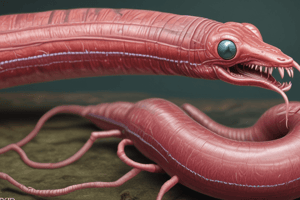Podcast
Questions and Answers
What end is highlighted in green?
What end is highlighted in green?
Posterior end (anus segment of worm)
What end is highlighted in white?
What end is highlighted in white?
Anterior end (head side of worm)
Label 1.
Label 1.
Clitellum
Label 2.
Label 2.
Label 3.
Label 3.
Label ?
Label ?
Label 1.
Label 1.
Label 2.
Label 2.
Label ?
Label ?
What are these known as?
What are these known as?
Label ?
Label ?
Label 7.
Label 7.
Label 1.
Label 1.
Label 2.
Label 2.
Label 3.
Label 3.
Label 4.
Label 4.
Label 5.
Label 5.
Label 6.
Label 6.
Label ?
Label ?
Label 1.
Label 1.
Label 2.
Label 2.
Label ridges.
Label ridges.
Flashcards are hidden until you start studying
Study Notes
Earthworm Anatomy and Functions
- Posterior End: Refers to the anus segment of the earthworm, located at the tail end, critical for waste removal.
- Anterior End: Indicates the head side of the worm where ingestion begins and sensory organs are located.
- Clitellum: A pronounced swelling on the body of sexually mature worms, vital for the formation of copulatory structures and egg capsules (cocoons).
- Prostomium: The first segment where food enters, functioning as a sensory structure analogous to eyes in other organisms.
- Segment: Earthworms are made up of numerous segments, allowing for flexibility and movement.
- Female Genital Pore: Opening used for the release of eggs, a crucial aspect of the reproductive process.
- Male Genital Pore: Opening that facilitates the transfer of sperm to other earthworms during mating.
- Sperm Groove: A specialized canal through which sperm travels to reach the seminal receptacles of another worm during reproduction.
- Opening of Seminal Vesicles: This structure stores the earthworm's sperm until it's utilized in mating.
- Setae: Small bristles located on each segment that assist in anchoring and movement through soil, enhancing locomotion.
- Intestine: Responsible for chemical digestion and nutrient absorption; secretes digestive enzymes to process food effectively.
- Pharynx: Muscular structure that draws food into the mouth and secretes mucus to aid in digestion.
- Esophagus: The conduit that connects the mouth to the crop, facilitating the transport of food.
- Aortic Arches: Also known as "hearts," they pump blood throughout the body, playing a key role in circulation.
- Crop: Functions as a storage organ for food before digestion begins.
- Gizzard: A muscular structure that grinds food with ingested stones to facilitate further digestion.
- Dorsal Blood Vessel: A primary vessel that transports blood toward the anterior end of the worm, ensuring organ perfusion.
- Ventral Nerve Cord: Integral for transmitting signals between the nervous system and body, aiding in coordination and reflexes.
- Seminal Receptacles: Structures that store sperm received from other worms, essential for reproductive processes.
- Rugae: Folds or ridges within the digestive system that increase surface area for effective digestion and absorption.
Studying That Suits You
Use AI to generate personalized quizzes and flashcards to suit your learning preferences.




